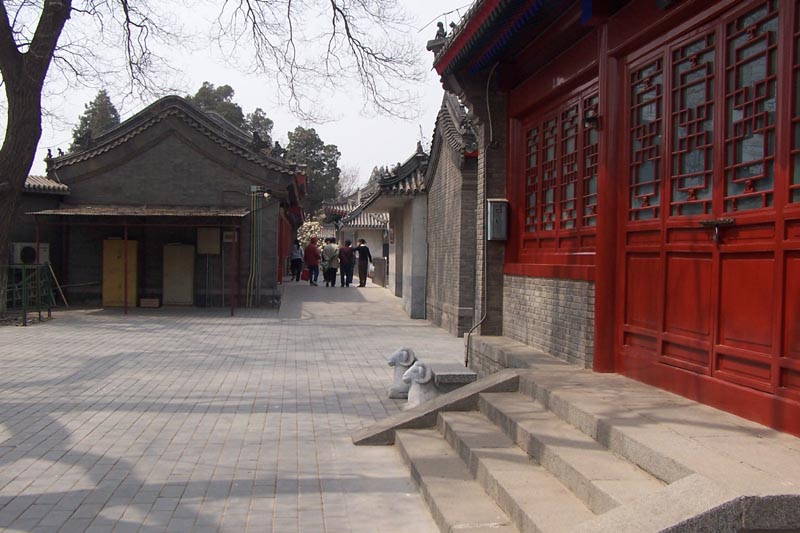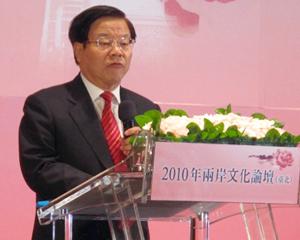|
Liu Fuzhi
Liu Fuzhi (March 1917 – 25 August 2013) was a politician of the People's Republic of China. He served as the Procurator-General of the Supreme People's Procuratorate, Minister of Public Security, and Minister of Justice. Biography Liu was born in Mei County, Guangdong province in 1917. In 1937, he entered the Yan'an North Shaanxi Public School and joined the Communist Party of China the following year. He served as Secretary-General of the Eighth Route Army Commander Zhu De, Director of the 129th Division of the Eighth Route Army, Secretary of the Political Commissar Deng Xiaoping, Chief of the Department of Political Affairs of the 129th Division of the Political Department of the 129th Division, Director of the Social Department of the Central Committee of the Shanxi-Hebei Central Committee, Director of the Social Affairs Department of the North China Bureau of the CPC Central Committee, and Central Military Commission Deputy Director of the General Office of the Minist ... [...More Info...] [...Related Items...] OR: [Wikipedia] [Google] [Baidu] |
Yang Yichen (1914–1997)
Yang Yichen (; March 31, 1914 – June 28, 1997) was a politician of the People's Republic of China. Biography Yang Yichen was born in Faku County, Liaoning in 1914. After the Cultural Revolution, Yang was the Secretary of the CPC Heilongjiang Committee. He was the Procurator-General of the Supreme People's Procuratorate from 1983 to 1988. Yang was a member of the 11th and 12th CPC Central Committee from 1977 to 1987. Yang Yichen died in Beijing } Beijing ( ; ; ), alternatively romanized as Peking ( ), is the capital of the People's Republic of China. It is the center of power and development of the country. Beijing is the world's most populous national capital city, with over 21 ... on June 28, 1997. '' [...More Info...] [...Related Items...] OR: [Wikipedia] [Google] [Baidu] |
Deng Xiaoping
Deng Xiaoping (22 August 1904 – 19 February 1997) was a Chinese revolutionary leader, military commander and statesman who served as the paramount leader of the People's Republic of China (PRC) from December 1978 to November 1989. After CCP chairman Mao Zedong's death in 1976, Deng gradually rose to supreme power and led China through a series of far-reaching market-economy reforms earning him the reputation as the "Architect of Modern China". He contributed to China becoming the world's second largest economy by GDP nominal in 2010. Born in the province of Sichuan in the Qing dynasty, Deng studied and worked in France in the 1920s, where he became a follower of Marxism–Leninism and joined the Chinese Communist Party (CCP) in 1924. In early 1926, Deng travelled to Moscow to study Communist doctrines and became a political commissar for the Red Army upon returning to China. In late 1929, Deng led local Red Army uprisings in Guangxi. In 1931, he was demoted within the ... [...More Info...] [...Related Items...] OR: [Wikipedia] [Google] [Baidu] |
China University Of Political Science And Law
China University of Political Science and Law (CUPL; Simplified Chinese characters, simplified Chinese: 中国政法大学; Traditional Chinese characters, traditional Chinese: 中國政法大學; pinyin: ''Zhōngguó Zhèngfǎ Dàxué'', abbr. 法大, ''Fǎ Dà'') is a research university established in 1952 in Beijing, China. It is the No. 1 political science and law university in China and within the top 10 worldwide. It is widely regarded as the 'Harvard of the East', with a strong emphasis on the research and teaching of law, politics, economics, management, sociology, history, and philosophy. CUPL is a top tier institution included in the nation's Double First Class University Plan, former Project 211, Project 985, Project 985 Innovative Platforms for Key Disciplines as part of the national endeavor to build world-class universities. Evaluated by the Ministry of Education of the People's Republic of China, Ministry of Education, it achieved the highest status "A+" in legal st ... [...More Info...] [...Related Items...] OR: [Wikipedia] [Google] [Baidu] |
Cao Haibo
Cao Haibo (born on 23 April 1985), is a Chinese dissident who sentenced to eight years in prison for attempting to found an opposition political party in the People's Republic of China, named the China Republican Party. A court in Kunming, Yunnan province, sentenced him to eight years in prison for "subversion of state power" (a more serious charge than inciting subversion of state power, which he had originally been charged with) in trying to form a party and for online messages criticising the ruling Chinese Communist party. His lawyer, Ma Xiaopeng, announced plans to appeal the conviction and sentences. With a reduction of 13 months from his sentence Cao was released from jail on 20 September 2018. See also * List of Chinese dissidents This list consists of activists who are known as Chinese dissidents. The label is primarily applied to intellectuals who "push the boundaries" of society or criticize the policies of the government. Examples of the former include Wei Hui an ... [...More Info...] [...Related Items...] OR: [Wikipedia] [Google] [Baidu] |
Minister Of Public Security Of The People's Republic Of China
The Ministry of Public Security () is a government ministry of the People's Republic of China responsible for public and political security. It oversees more than 1.9 million of the country's law enforcement officers and as such the vast majority of the People's Police (). The MPS is a nationwide police force; however, counterintelligence and so-called "political security" remain core functions. The ministry was established in 1949 (after the Chinese Communist Party's victory in the Chinese Civil War) as the successor to the Central Social Affairs Department and was known as "Ministry of Public Security of the Central People's Government" until 1954. Grand General Luo Ruiqing of the People's Liberation Army (PLA) was its first minister. As the ministry's organization was based on Soviet and Eastern Bloc models, it was responsible for all aspects of national security; ranging from regular police work to intelligence, counterintelligence and the suppression of anti-communist ... [...More Info...] [...Related Items...] OR: [Wikipedia] [Google] [Baidu] |
Babaoshan Revolutionary Cemetery
The Babaoshan Revolutionary Cemetery () is Beijing's main resting place for the highest-ranking revolutionary heroes, high government officials and, in recent years, individuals deemed of major importance due to their contributions to society. In Chinese, ''Babaoshan'' literally means "The Eight-Treasure Mountains". The cemetery is located in the Shijingshan District, a municipality located in western Beijing. History The Babaoshan Revolutionary Cemetery, with an area of 0.10 square kilometres and located in the western frontiers of Beijing's massive urban sprawl, was first built as a temple in honor of General Gang Bing, a Ming dynasty soldier who castrated himself as an act of obedience for the Yongle Emperor. The emperor designated the area surrounding the temple as the final resting place of concubines and eunuchs. Over time, the Taoist temple became a place for retired eunuchs only, which it remained for five centuries of imperial rule until it was converted to honor the e ... [...More Info...] [...Related Items...] OR: [Wikipedia] [Google] [Baidu] |
Central Advisory Committee
The Central Advisory Commission () (CAC) was a body of the Chinese Communist Party that existed during the era of the paramount leadership of Deng Xiaoping. The body was supposed to provide "political assistance and consultation" to the Party's Central Committee; however, as the CAC was a select group of senior Party members, it was often seen as having more authority unofficially than that body. History The commission was established after the Twelfth Party Congress in 1982, and abolished in 1992. Its chairmen were Deng Xiaoping (1982–1987) and Chen Yun (1987–1992). Its membership was offered only to members of the Central Committee with forty years or more of service which made it an important forum for the Eight Elders to remain formally involved in politics. Directors and deputy directors were required to have first served in the Politburo or Standing Committee. Despite being supposedly advisory its power surpassed that of the Politburo Standing Committee and was nick ... [...More Info...] [...Related Items...] OR: [Wikipedia] [Google] [Baidu] |
Central Committee Of The Communist Party Of China
The Central Committee of the Chinese Communist Party, officially the Central Committee of the Communist Party of China, is a political body that comprises the top leaders of the Chinese Communist Party (CCP). It is currently composed of 205 full members and 171 alternate members (see list). Members are nominally elected once every five years by the National Congress of the Chinese Communist Party. In practice, the selection process is done privately, usually through consultation of the CCP's Politburo and its corresponding Standing Committee. The Central Committee is, formally, the "party's highest organ of authority" when the National Congress is not in a plenary session. According to the CCP's constitution, the Central Committee is vested with the power to elect the General Secretary and the members of the Politburo and its Standing Committee, as well as the Central Military Commission. It endorses the composition of the Secretariat and the Central Commission for Disciplin ... [...More Info...] [...Related Items...] OR: [Wikipedia] [Google] [Baidu] |
Chinese People's Armed Police Force
) , abbreviation = PAP ("People's Armed Police") CAPF ("Chinese Armed Police Force"), formerly abbreviated''Wujing'' ( zh , s = 武警 , p = Wǔjǐng , l = Armed Police , labels = no ), or WJ as on vehicle license plates , patch = PAP Armband.svg , patchcaption = Armband of the People's Armed Police , logo = Emblem of PAP Helicopter.svg , logocaption = Emblem of People's Armed Police helicopters , badge = PAP Badge.png , badgecaption = (since 1 August 2021) , flag = People's Armed Police Flag.svg , flagcaption = Flag of the People's Armed Police Force , imagesize = , motto = , mottotranslated = (Serve the People) , formed = , preceding1 = , dissolved = , superseding = , employees = 1.5 million , budget = , legalpersonality = Paramilitary organisation, law enforcement organisation , country = Chin ... [...More Info...] [...Related Items...] OR: [Wikipedia] [Google] [Baidu] |
National People's Congress
The National People's Congress of the People's Republic of China (NPC; ), or simply the National People's Congress, is constitutionally the supreme state authority and the national legislature of the People's Republic of China. With 2,980 members in 2018, it is the largest legislative body in the world. The National People's Congress meets in full session for roughly two weeks each year and votes on important pieces of legislation and personnel assignments among other things, and due to the temporary nature of the plenary sessions, most of NPC's power is delegated to the Standing Committee of the National People's Congress (NPCSC), which consists of about 170 legislators and meets in continuous bi-monthly sessions, when its parent NPC is not in session. As China is an authoritarian state, the NPC has been characterized as a rubber stamp for the Chinese Communist Party (CCP) or as only being able to affect issues of low sensitivity and salience to the Chinese regime. M ... [...More Info...] [...Related Items...] OR: [Wikipedia] [Google] [Baidu] |
Ministry Of Culture Of The People's Republic Of China
The Ministry of Culture (MOC) was a ministry of the government of the People's Republic of China which was dissolved on 19 March 2018. The responsibilities of the MOC, which were assumed by the Ministry of Culture and Tourism, encompassed cultural policy and activities in the country, including managing national museums and monuments; promoting and protecting the arts (including censorship of visual, folk, theatrical, musical, dance, architectural, literary, televisual and cinematographic works); and managing the national archives and regional culture centers. Its headquarters were in Chaoyang District, Beijing. Duties The duty of the ministry was to digitize and preserve public domain works, and make them available and accessible to every citizen. China had millions of public domain works, including but not limited to books, pictures, music and films. List of ministers See also *China Arts and Entertainment Group *Ministries of the People's Republic of China Refere ... [...More Info...] [...Related Items...] OR: [Wikipedia] [Google] [Baidu] |
.jpg)



.jpg)
.jpg)
